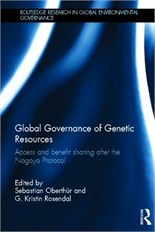Authors
Sebastian Oberthür & G. Kristin Rosendal
Publication Year
2014
Source
Routledge Publishing Elgar Publishing Ltd
268 pages
Series
Routledge Research in Global Environmental Governance
Series Editor: Philipp Pattberg, Agni Kalfagianni
Partly due to its seeming technical complexity, ABS governance has so far not been at the centre of attention of scholars and practitioners of global environmental governance. In this book, care is taken to provide an accessible account of key functional features of the governance system which enables non-specialists to gain a grasp on the main issues involved, allowing the issue of ABS governance to move centre-stage and be more fully recognised in discussions on global environmental governance.
| TABLE OF CONTENTS |
List of Figures and Tables
List of Contributors
Foreword
About COST
Acknowledgements
Abbreviations
1. Global Governance of Genetic Resources: Background and Analytical Framework
Sebastian Oberthür and G. Kristin Rosendal
2. The Term ‘Genetic Resources’: Flexible and Dynamic while Providing Legal Certainty?
Morten Walløe Tvedt and Peter Johan Schei
3. The Negotiations of the Nagoya Protocol: Issues, Coalitions and Process
Linda Wallbott, Franziska Wolff and Justyna Pożarowska
4. The Role of Non-state Actors in the Nagoya Protocol Negotiations
Amandine Orsini
5. The Role of the European Union in the Negotiations on the Nagoya Protocol: Self-interested Bridge Building
Sebastian Oberthür and Florian Rabitz
6.The Role of Switzerland in the Nagoya Protocol Negotiations
Marc Hufty, Tobias Schulz, and Maurice Tschopp
7. Goals, Strategies and Success of the African Group in the Negotiations of the Nagoya Protocol
Linda Wallbott
8. The Nagoya Protocol and the Diffusion of Economic Instruments for Ecosystem Services
Franziska Wolff
9. Beyond Nagoya: Towards a Legally Functional System of Access and Benefit-sharing Morten Walløe Tvedt
10. The Impact of the Nagoya Protocol on the Evolving Institutional Complex of ABS Governance
Sebastian Oberthür and Justyna Pożarowska
11. Balancing ABS and IPR Governance in the Aquaculture Sector
G. Kristin Rosendal, Ingrid Olesen and Morten Walløe Tvedt
12. Governance Options for ex-situ Collections in Academic Research
Susette Biber-Klemm, Kate Davis, Laurent Gautier and Sylvia I. Martinez
13. Conclusions: An Assessment of Global Governance of Genetic Resources after the Nagoya Protocol
Sebastian Oberthür and G. Kristin Rosendal
Index
About the author

Sebastian Oberthür

G. Kristin Rosendal
Research Professor at Fridtjof Nansen Institute, Norway


